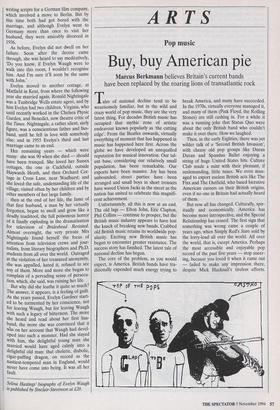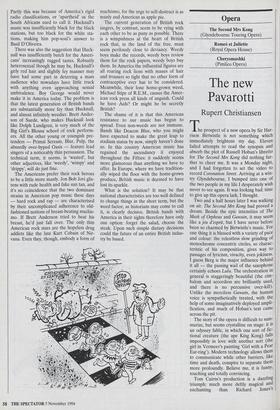ARTS
Pop music
Buy, buy American pie
Marcus Berkmann believes Britain's current bands have been replaced by the roaring lions of transatlantic rock
Tales of national decline tend to be wearisomely familiar, but in the wild and crazy world of pop music, they are the very latest thing. For decades British music has occupied that mythic zone of artistic endeavour known popularly as 'the cutting edge'. From the Beatles onwards, virtually everything of moment that has happened in music has happened here first. Across the globe we have developed an unequalled reputation for musical innovation. Our tal- ent base, considering our relatively small population, has been remarkable. Our exports have been massive. Joy has been unbounded, street parties have been arranged and small boys in short trousers have waved Union Jacks in the street as the nation has united to celebrate this magnifi- cent achievement.
Unfortunately, all this is now at an end. The old lags — Elton John, Eric Clapton, Phil Collins — continue to prosper, but the British music industry appears to have lost the knack of breaking new bands. Crabbed old British music retains its worldwide pop- ularity. Exciting new British music has begun to encounter greater resistance. The success story has finished. The latest tale of national decline has begun.
The core of the problem, as you would expect, is America. British bands have tra- ditionally expended much energy trying to break America, and many have succeeded. In the 1970s, virtually everyone managed it, and many of them (Pink Floyd, the Rolling Stones) are still cashing in. For a while it was a running joke that Status Quo were about the only British band who couldn't make it over there. How we laughed.
Then, in the early Eighties, there was yet wilder talk of a 'Second British Invasion', with cheesy old pop groups like Duran Duran and Spandau Ballet enjoying a string of huge United States hits. Culture Club made a mint with their pleasant, if undemanding, little tunes. We even man- aged to export useless British acts like The Fixx and The Outfield, who based lucrative American careers on their British origins, even if no one in Britain had actually heard of them.
But now all has changed. Culturally, spir- itually and economically, America has become more introspective, and the Special Relationship has ceased. The first sign that something was wrong came a couple of years ago, when Simply Red's Stars sold by the lorry-load all over the world. All over the world, that is, except America. Perhaps the most accessible and enjoyable pop record of the past five years — stop sneer- ing, because you loved it when it came out — failed to make any impression there, despite Mick Hucknall's tireless efforts. Partly this was because of America's rigid radio classifications, or 'apartheid' as the South Africans used to call it. Hucknall's music was insufficiently black for the black stations, but too black for the white sta- tions, making him pop-soul's answer to Basil D'Oliveira.
There was also the suggestion that Huck- nail was insufficiently butch for the Ameri- cans' increasingly rugged tastes. Robustly heterosexual though he may be, Hucknall's girly red hair and slightly fey manner may have had some part in deterring a mass audience who nowadays have little truck with anything even approaching sexual ambivalence. Boy George would never make it in America today. The problem is that the latest generation of British bands are substantially more fey than Hucknall, and almost infinitely weedier. Brett Ander- son of Suede, who makes Hucknall look like Dolph Lundgren, is very much of the Big Girl's Blouse school of rock perform- ers. All the other young or youngish pre- tenders — Primal Scream, Blur, Pulp, the absurdly over-hyped Oasis — feature lead singers of a noticeably thin persuasion. The technical term, it seems, is 'wasted', but other adjectives, like 'weedy', `wimpy' and `drippy', will do just fine. The Americans prefer their rock heroes to be a little more manly. Jon Bob Jovi glis- tens with rude health and fake sun tan, and it's no coincidence that the two dominant strains in American pop music these days — hard rock and rap — are characterised by their uncomplicated adherence to old- fashioned notions of breast-beating machis- mo. If Brett Anderson tried to beat his breast, he'd just fall over. The only thin American rock stars are the hopeless drug addicts like the late Kurt Cobain of Nir- vana. Even they, though, embody a form of machismo, for the urge to self-destruct is as manly and American as apple pie.
The current generation of British rock singers, by contrast, seem to be vying with each other to be as puny as possible. There is a wimpishness at the heart of British rock that, in the land of the free, must seem perilously close to deviancy. Weedy boys make the records, weedy boys review them for the rock papers, weedy boys buy them. In America the influential figures are all roaring rock lions with manes of hair and trousers so tight that no other form of contraceptive ever has to be considered. Meanwhile, their lone home-grown weed, Michael Stipe of R.E.M., causes the Amer- ican rock press all kinds of anguish. Could he have Aids? Or might he be secretly British?
The shame of it is that this American resistance to our music has begun to spread. Even non-weeds are not immune. Bands like Deacon Blue, who you might have expected to make the great leap to stadium status by now, simply haven't done so. In this country American music has regained the ascendancy it enjoyed throughout the Fifties: it suddenly seems more glamorous than anything we have to offer. In Europe, where we have tradition- ally wiped the floor with the home-grown produce, British music is kemed to have lost its sparkle.
What is the solution? It may be that national characteristics are too well defined to change things in the short term, but the weed factor, as historians may come to call it, is clearly decisive. British bands with America in their sights therefore have only one option: forget the salad, choose the steak. Upon such simple dietary decisions could the future of an entire British indus- try be based.











































































 Previous page
Previous page